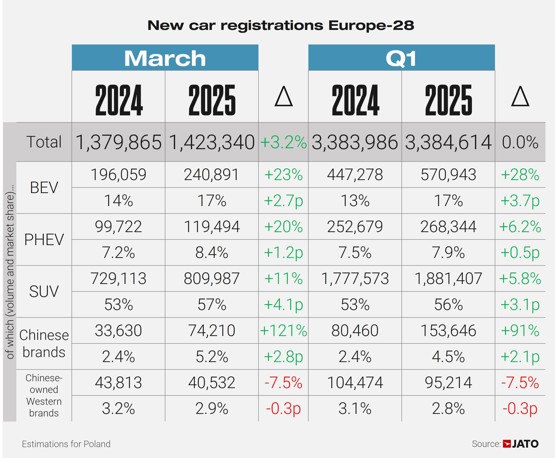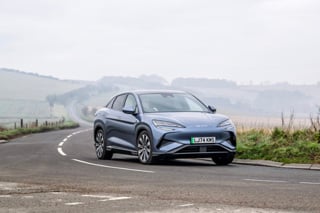The UK was the largest market for new car sales in March, driving an uptick in registrations across the continent.
More than 1.4 million cars were registered in European countries last month, according to data from Jato Dynamics. Total sales were up by 3.2% year-on-year - helping to offset the declines recorded in January and February.
The UK market saw an improvement of 13% - a total of 357,103 new cars were registered during March in the UK, according to the Society of Motor Manufacturers and Traders (SMMT) - while increases were also recorded in Italy and Spain. Germany and France both experienced declines, with drops of 3.9% and 15% respectively.
Electric vehicles (EVs) accounted for 16.9% of total registrations, marking an increase of 2.7 percentage points in market share compared to March 2024, as volumes rose by 23% year on year. In terms of units registered, this was the strongest quarter for EVs on record.

Felipe Munoz, global analyst at Jato Dynamics, said: “March was a momentous month for EV registrations in Europe, indicating that the positive response we are seeing to the continually broadening offer is finally having a real impact on the overall market.”
Despite the momentum behind EV uptake in Europe, Tesla – the world’s largest EV maker by sales volume in 2024 – recorded a 30% drop in registrations. It was less severe than those recorded in January (-47%) and February (-44%).
“As the brand continues to deal with a host of PR issues in addition to the changeover of the Model Y, Tesla is now relying on the Model 3 to offset its loses”, Munoz explained. The midsize saloon recorded an increase of 1.1% to reach 12,500 units, topping the BEV ranking alongside the Model Y.
While the Model Y (-49%) and Model 3 (-14%) both recorded notable declines between January and March, they were still able to outsell all other electric cars in Europe.
In March, the Dacia Sandero lost its title as Europe’s most registered new car to its rival from Stellantis, the Peugeot 208. Despite the change in leadership, the Sandero continued to lead over the quarter, with the 208 following in second place. Among the top ten, the Volkswagen Tiguan saw a 42% increase in registrations, while the Peugeot 2008 and Opel/Vauxhall Corsa also performed well.
Other standout performers included the MG ZS, the success of which was driven by the launch of its new generation – now available exclusively as a full hybrid, rather than an electric model.
Munoz said: “The initial success of the MG ZS is an example of how Chinese manufacturers are adjusting their strategies in response to EU tariffs on Chinese electric vehicles.” Other models that also recorded impressive growth include the Peugeot 3008 (+60%), the Seat/Cupra Leon (+28%), the Jeep Avenger (+56%), the Skoda Kodiaq (+34%) and the Suzuki Swift (+54%)
Among the latest market entries, MG registered nearly 9,800 units of the MG3, which is also powered by a hybrid engine. Renault followed closely with 9,330 units of the new Symbioz, while Fiat/Abarth recorded 8,000 units of the 600.
The Volkswagen ID7 emerged as the fourth most-registered electric vehicle in March, with 7,438 units, closely followed by the Kia EV3 at 7,173 units. BYD recorded 7,144 registrations, with over 6,500 of those being plug-in hybrids. Jaecoo registered 7,000 units of the Jaecoo 7 – despite it not being available as an electric or plug-in hybrid. Interestingly, the same number of units was registered for the Renault 5, which ranked as the eighth most popular electric car for the month.





















Login to comment
Comments
No comments have been made yet.